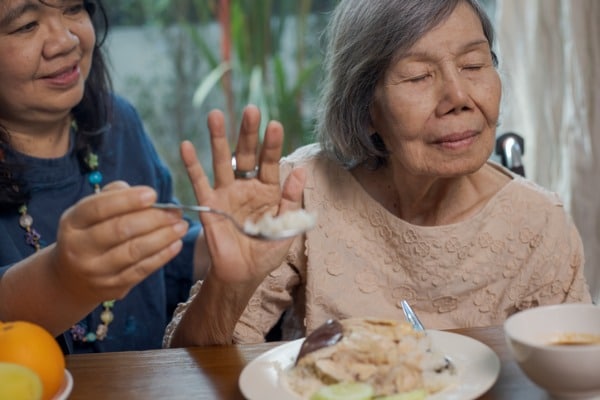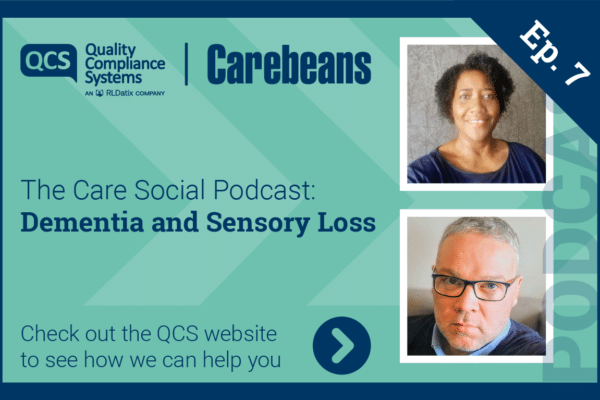Why language matters in dementia care
We need to talk about that four-letter ‘F’ word that is heard so often in dementia care settings. It is a word that shocks me every time I hear it, implying a non-person-centred culture that treats individuals as insentient beings to be done to rather than people with feelings and the capacity for relationship with others. Before we get too excited, the word I would like to discuss is ‘feed’.
What is the person-centred alternative to ‘feeding’ an individual? I like to think that it is to dine with the person. And what is the difference between feeding and dining? Dining is not only the act of eating and drinking to me, it is also the opportunity for a much more enriched experience in an environment that entertains and stimulates all of my senses and more so when in connection with others when I can also engage socially in an enriched experience.
Why the dining experience matters for people living with dementia
This is important to us all and particularly so if the person is living with dementia. Receiving information via the senses results in higher brain activity of attention, thinking, reasoning, speech, perception, planning and, decision-making. Social stimulation adds to the activity, enhancing well-being and supporting the maximum potential of the individual. Given that eating and drinking well is vital to good health, the importance of optimising the dining experience should not be underestimated.
A personal perspective on dining in dementia care
I recall when I used to visit my Mum in a dementia care home, that I would often visit at a meal time so that I could dine with her and not only use this time as an enjoyable activity with her but also provide the care staff with an extra pair of hands. I did note that sometimes though, I was the only non-resident there and the staff had simply served the meals and then left residents to their own devices while they supported those who were staying in their own rooms. I once observed a lady unable to get going with the act of eating and she simply sat and stared at her meal. The gentleman opposite, who obviously had a hearty appetite, reached across to take her plate and scraped all the content onto his own plate. He had just finished eating it all when the housekeeping team member arrived to clear the tables and cheerfully congratulated the lady on eating all of her meal. If I hadn’t been there, no-one would have been aware of this lady’s dilemma and the potential resulting behaviour triggered by hunger might have been assumed to be a symptom of her dementia.
When support falls short: an example from a hospital setting
Another time, when I was working as a Consultant Occupational Therapist to a Hospital, I observed a healthcare assistant standing over the shoulder of a lady, spooning food into her mouth and not paying any attention to the lady. The television was on and assistant was watching that rather than the lady. Food was going everywhere and the lady became very distressed. Of course, this is an extreme example of how not to support someone to dine and many care settings do provide much better support than that.
However, there is often a lack of understanding of how to support a person and truly engage with them whatever their level of dementia. There is a skill in knowing how to provide the ‘just right’ type of help and how to communicate, relate and connect with a person, no matter their degree of disability.
Meeting CQC expectations through person-centred dining
Care Quality Commission fundamental standards state that service users must have person-centred care or treatment that is tailored to and meets service users’ needs and preferences and, of course, inspectors look for evidence that individuals’ needs are being met. The Pool Activity Level (PAL) Instrument is a well-respected and valid tool for identifying the level of cognitive and functional ability of an individual and provides guidance on how to support the individual to dine, given their specific level of ability. The Guide also provides support on how to create an enabling dining room environment.
What can you do to make ‘dining’ a reality?
Use the PAL Instrument free of charge
Download the PAL and try using it to improve the experience of your service users, develop the practice of your team and evidence to your CQC Inspector how you are continuing to develop your service?
Watch our webinar: Best Practice in Dining for People Living with Dementia
And please remember, remove the ‘f*%#’ word from your team’s vocabulary – ‘dine’ is the word. How will you make it a reality?
Not sure where to learn about or start providing better Dementia care?
Watch our video and find out more here








